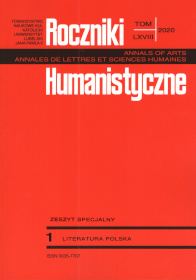„Zapowiada się nadzwyczajny aktor”. Karol Wojtyła w podziemnym Teatrze Rapsodycznym
“He Seems an Extraordinary Actor.” Karol Wojtyła in the Underground Rhapsodic Theatre
Author(s): Stanisław DziedzicSubject(s): Theatre, Dance, Performing Arts, Language and Literature Studies, Fine Arts / Performing Arts, Studies of Literature, Polish Literature
Published by: Towarzystwo Naukowe KUL & Katolicki Uniwersytet Lubelski Jana Pawła II
Keywords: Karol Wojtyła; Rhapsodic Theatre; Studio 39; Tyniecka Street; Mieczysław Kotlarczyk
Summary/Abstract: Karol Wojtyła’s decision to start Polish Philology at the Jagiellonian University after graduating from the State Marcin Wadowita Secondary School was no surprise to those who knew him in Wadowice. His theatrical interests and talents, mainly acting and directing, were widely known. He helped found a high school theatrical group, acted in the Amateur Universal Theatre run by Mieczysław Kotlarczyk, and on the stage of the Catholic House. His mentor in the field of the theatre was Mieczysław Kotlarczyk. As a secondary school student, Wojtyła had already started writing poetry, and possibly his Beskid Ballads had already been created.He wanted to become an actor, but also developed as a writer. Cracow, with its creative environment and student peers, supported his theatrical and literature endeavours. Besides his university studies, he also developed his acting skills in the Studio 39 theatre group. During the Nazi occupation of Poland, Studio 39 members continued their underground activities. After Mieczysław Kotlarczyk arrived in Cracow in 1941, the Studio was transformed into the Rhapsodic Theatre. Wojtyła participated in all 7 premiere performances. With his talent and acting capabilities, together with his deep theatrical knowledge, he was a rising hope for his underground companions in the field of acting. His skills were appreciated by such famous actors as Juliusz Osterwa. Osterwa, the chief Polish actor of those times, stated “We seem to have an extraordinary actor” after Juliusz Słowacki’s Król-Duch was performed with Wojtyła starring. He intended to employ Wojtyła after the war. However, the time to make definitive choices finally arrived and Karol Wojtyła entered the Higher Seminary for Priests in 1942. His rhapsodic experience and literary achievements were to be the measurement of his charismatic call to millions of followers and believers as the future Pope.
Journal: Roczniki Humanistyczne
- Issue Year: 68/2020
- Issue No: 1S
- Page Range: 153-171
- Page Count: 19
- Language: Polish

